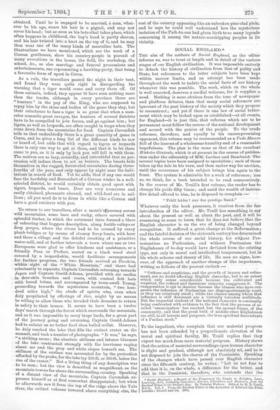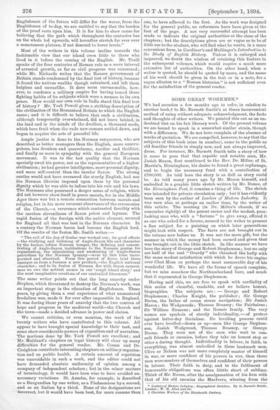SOCIAL ENGLAND.* Tars aim of the authors of Social England,
as the editor informs us, was to treat at length and in detail of the various= stages of our English civilisation. It was impossible entirely to detach the history of civilisation from that of polity and State, but references to the latter subjects have been kept within narrow limits, and an attempt has been made throughout the work to isolate the social facts of our history whenever this was possible. The work, which on the whole- is well executed, deserves a cordial welcome, for it supplies a need. Nothing is more obvious from the tone of newspaper and platform debates, than that many social reformers are ignorant of the past history of the society which they propose to reconstruct; and yet if there is one law of social better- ment which may be looked upon as established—at all events, for England—it is just this, that reforms which are to be permanent must follow the course of the national development and accord with the genius of the people. To the crude reformer, therefore, and equally to his uncompromising opponent, this volume may be recommended as a Vade Mecum full of the lessons of a wholesome humility and of a reasonable hopefulness. The plan is the same as that of the excellent Hisioire Gene' rale, which is at present in the course of publica-
tion under the editorship of MM. Lavisse and Rambaud. The several topics have been assigned to specialists ; each of these
takes up the tale in his turn, and then makes way for another, until the recurrence of his subject brings him again to the front. The system is admirable for a work of reference ; less. so, we think, for a book intended to be read consecutively. In the course of Mr. Traill's first volume, the reader has to, change his guide fifty times; and amid the wealth of instruc- tive detail offered to him, he is disposed to complain :- " Fehlt leider I nur des geistige 33and."
Whatever unity the book possesses, it receives from the fine introduction of the editor. Mr. Trail has something to say about the present as well as about the past, and it will be reassuring to some to learn that he does not believe that the English character is on the eve of being changed beyond recognition. It suffered a great change at the Reformation;. and the fateful decision of the sixteenth century has determined the whole course of our social history, for without Pro- testantism no Puritanism, and without Puritanism the Englishman of to-day would have deviated from the existing type, not only in moral and intellectual temperament, but in his whole scheme and theory of life. He sees no signs, how- ever, of the approach of another change of like importance, writing as follows of the present outlook :— " Culture and scepticism, and the growth of luxury and refine- ment, are no doubt affecting English character, but to an extent which only seems considerable because the cultivated and sceptical, the refined and luxurious minority exaggerate it. The exaggeration is apt to deceive because the classes who have out- grown the influence of Puritanism are disproportionately vocal, as they are relatively small ; while the classes among whom that influence is still dominant are a virtually voiceless multitude. But the impartial student of the national character is constantly being confronted with evidence to the fact that the process of w- eaned emancipation' has reached but the merest fringe of the community, and that the great bulk of middle-class Englishmen are still, to all intents and purposes, the true spiritual descendants. of a Puritan stock."
To the impatient, who complain that our material progress. has not been attended by a proportionate elevation of the moral and spiritual faculty, Mr. Traill replies that they expect too much from mere material progress. History shows= that the action of material surroundings upon human character is slight and gradual, although not absolutely nil, and he is. not disposed to join the chorus of the Pessimists. Speaking of the changes which have passed over English character since the fifteenth century, he writes: "Let us not fear to add that it is, on the whole, a difference for the better, and that to the Pessimist, therefore, who contends that the * Social Eneancl a Record of the Progress of the Foote in Religion, Laws,. Learning , Arts, Industry, Commerce, $ciemce, Lituraturs, and Aram/ors, from tho Burliest Times to the Present Dal,. By Various Writers. Edited by H. D. Traill, D.O.L. Vol. I. From the Earliest Times to the Accession 0 Edward the Era.. Loudon s Cassell sad Co. 1888. Englishman of the future will differ for the worse, from the Englishman of to-day, we are entitled to say that the burden of the proof rests upon him. It is for him to show cause for believing that the path which throughout the centuries has on the whole led upwards, will hereafter stretch for ever over a monotonous plateau, if not descend to lower levels."
Most of the writers in this volume incline towards the fashionable view that our island owes little to those who lived in it before the coming of the English. Mr. Traill speaks of the four centuries of Roman rule as a mere interval of arrested growth, as far as civil progress was concerned ; while Mr. Richards writes that the Roman government of Britain stands condemned by the final test of history, because it found the natives warlike though untrained, and left them helpless and nnwarlike. It does seem unreasonable, how- ever, to condemn a military empire for having tamed those fighting habits of its subjects which were a menace to its own peace. How would our own rule in India stand this final test of history P Mr. York Powell gives a striking description of the civilisation of the Romanised Britain to which the English came ; and it is difficult to believe that such a civilisation, although temporarily overwhelmed, did not leave behind, in the land and in the minds of the dwellers, a thousand seeds, which bore fruit when the rude new-comers settled down, and began to acquire the arts of peaceful life.
Ample justice is done to the Norman conquerors, who are described as better managers than the English, more unscru- pulous, less drunken and quarrelsome, hardier and thriftier, and finally as more in sympathy with the general European movement. It was to the last quality that the Norman specially owed his power, not as the representative of a higher -civilization ; he had greater intelligence, more personal dignity, and more self-control than the insular Saxon. The strong -castles would not have overawed the sturdy English, had not the Norman likewise imposed upon them by the personal dignity which he was able to infuse into his rule and his laws. The Normans also possessed a deeper sense of religion, which did not however show itself in purer morals, for in the Middle Ages there was but a remote connection between morals and religion, but in his more reverent observance of the ceremonies of the Church,—a reverence which contrasted forcibly with the careless slovenliness of Saxon priest and layman. The rapid fusion of the foreign with the native element, secured for England all that was best in the Norman character. In a century the Norman baron had become the English lord. Of the results of the fusion Mr. Smith writes :— " The evil of the day of Senlac was worked ont ; its good effects the vivifying and widening of Anglo-Saxon life and character by the keener, loftier Norman temper, the defining and concen- trating of Anglo-Saxon institutions to the Norman genius for organisation, the stimulating and awakening of Anglo-Saxon patriotism by the Norman tyranny—were by this time incor- porated and absorbed. From this period of fierce trial there emerges as from a furnace a new product,—the English national character ; and to its fusion of Norman fire with Saxon earnest- ness we owe the noblest scenes in our trough island story,' and the most imaginative creations of our unrivalled literature."
The same writer points out that the long anarchy under Stephen, which threatened to destroy the Norman's work, was an important stage in the education of Englishmen. These years, by giving them a real experience of what unmastered feudalism was, made it for ever after impossible in England. It was during those years of anarchy that the two centres of hope and progress in the mediaeval world—the Church and the town—made a decided advance in power and claims.
We cannot criticise, or even mention, the work of the twenty writers who have contributed to this volume. All appear to have brought special knowledge to their task, and some show considerable powers of exposition and of narration. The portions done by Mr. York Powell are excellent; and Mr. Maitland's chapters on legal history will clear up many difficulties for the general reader. Mr. Conan and Dr. Creighton contribute interesting chapters on military organisa- tion and on public health. A certain amount of repetition was unavoidable in such a work, and the editor could not have demanded absolute uniformity of opinion among a company of independent scholars ; but in the minor matters of terminology, it would have been wise to have avoided un- necessary variations. St. Anselm, for example, is described As a Burgundian by one writer, as a Piedmontese by a second, and as an Italian by a third. None of the designations are incorrect, but it would have been best, for more reasons than one, to have adhered to the first. As the work was designed for the general public, no references have been given at the foot of the page. A not very successful attempt has been made to indicate the original authorities at the close of the chapters ; but the descriptions given are so vague as to be of little use to the student, who will find what he wants, in a more convenient form, in Gardiner's and Mullinger's Introduction to the Study of English. History. Unless it is enlarged and improved, we doubt the wisdom of retaining this feature in the subsequent volumes, which would require a much more extensive list of authorities. On the other hand, when a writer is quoted, he should be quoted by name, and the name of his work should be given in the text or in a note, for a vague allusion to a " Roman historian" is not sufficient even for the satisfaction of the general reader,



































 Previous page
Previous page